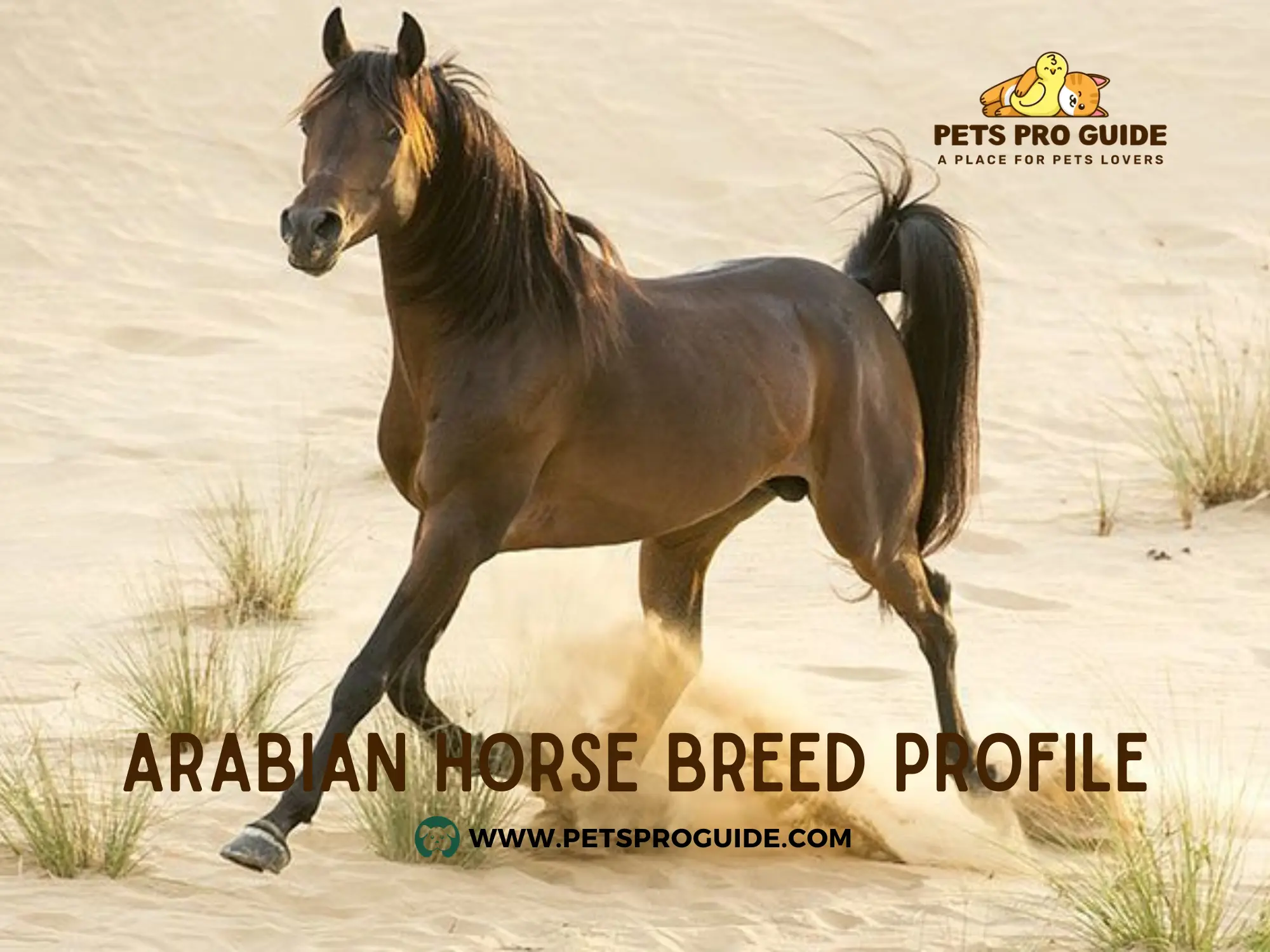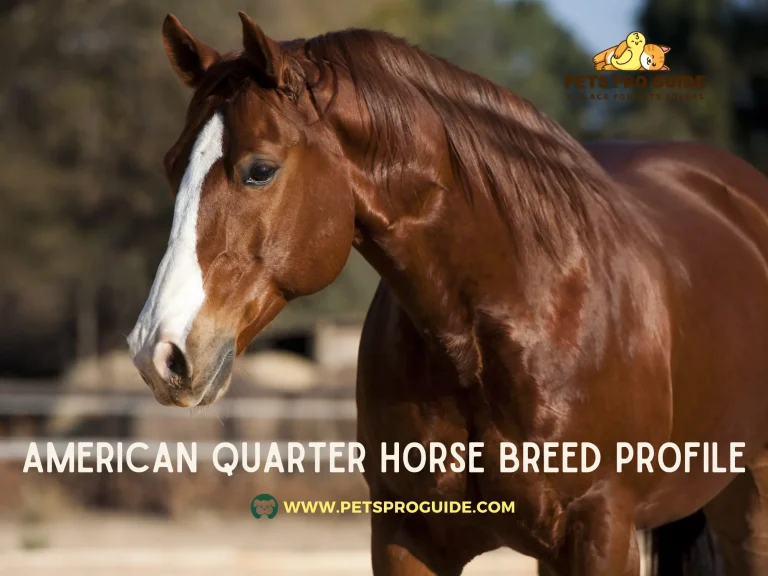Hello, readers! It’s Addison here, excited to share everything you need to know about the Arabian horse breed profile, along with some lovely pictures!
Arabian Horse Breed Profile – the name resonates with elegance, history, and unparalleled beauty. Renowned for their distinct appearance and noble demeanor, Arabian horses have captivated equestrians and enthusiasts worldwide for centuries. In this comprehensive guide, we delve into the captivating world of Arabian horses, exploring their origins, characteristics, care needs, and much more.
- Core Statistics
- History and Origins
- Appearance
- Personality
- Temperament
- Nutrition and Feeding
- Space Requirements
- Training & Exercise
- Arabian Horse Grooming
- Common Arabian Horse Breed Health Conditions
- Arabian Horse Care Pro Tips
- Is Arabian Horse Good Family Horse?
- What to know before you buy a Arabian Horse?
- Arabian Horse Breed Fun Facts
- Conclusion
- Read More
Arabian horses, often hailed as the “breed of kings,” trace their lineage back thousands of years to the deserts of the Arabian Peninsula. Revered for their stamina, intelligence, and striking beauty, these horses have left an indelible mark on history, serving as companions to warriors and prized possessions of royalty.
Core Statistics
Here are some core statistics:
- Common Name: Arabian Horse
- Height (Shoulder): 14.25-15.25 hands (57”-61” | 145-155 cm)
- Weight: 800-1000 lbs (363-454 kg)
- Body: Lithe, compact body; small, wedge-shaped head; dished facial profile, long, arched neck
- Head: Short, noble, big eyes
- Neck: Elegantly arched; fine mane
- Gait: Free, floating
- Life span: 25 – 30 years
- Best For: Experienced owners and riders (Racing, show jumping, leisure riding)
- Temperament: Bold, sensitive, intelligent, high-spirited
- Coat Colors: Bay, black, chestnut, gray
- Type: Thoroughbred
- Bred since: 7th century
- Origin: Arabian peninsula
History and Origins
The Arabian horse boasts a rich and storied history, with roots that can be traced back to ancient Bedouin tribes of the Arabian Desert. Renowned for their speed, endurance, and loyalty, Arabian horses played a pivotal role in the lives of the nomadic tribes, serving as trusted companions in times of peace and invaluable assets in times of war.
Appearance
Characterized by their dished face, arched neck, and high tail carriage, Arabian horses exhibit a distinctive and graceful appearance that sets them apart from other breeds. Their expressive eyes and finely chiseled features contribute to their allure and elegance, making them one of the most recognizable horse breeds in the world.
Personality
Arabian horses are renowned for their spirited yet gentle nature. Known for their intelligence and willingness to please, they form strong bonds with their human counterparts and excel in various equestrian disciplines, including endurance riding, dressage, and show jumping.
Temperament
With a temperament marked by curiosity, courage, and sensitivity, Arabian horses possess a natural affinity for their handlers and thrive on positive reinforcement and gentle guidance. Their innate intelligence and quick learning ability make them a joy to train and work with.
Nutrition and Feeding
Proper nutrition is essential for maintaining the health and vitality of Arabian horses. A balanced diet consisting of high-quality forage, grains, and supplements is crucial to meet their nutritional needs and support optimal growth and performance. It is recommended to consult with a veterinarian or equine nutritionist to develop a customized feeding plan tailored to your horse’s individual requirements.
Space Requirements
Arabian horses thrive in environments that provide ample space for exercise and movement. Whether they are young foals or mature adults, they benefit from access to spacious pastures or paddocks where they can graze, roam, and socialize with other horses.
Training & Exercise
- Begin training early to establish trust and respect
- Incorporate a variety of exercises to keep them mentally and physically stimulated
- Focus on positive reinforcement techniques
- Gradually introduce new skills and challenges
- Maintain consistency and patience throughout the training process
Arabian Horse Grooming
- Brush their coat regularly to remove dirt and debris
- Pay special attention to their mane and tail to prevent tangles
- Clean their hooves daily to prevent infections
- Schedule regular baths to keep their coat clean and shiny
- Trim their mane and tail as needed to maintain a neat appearance
Common Arabian Horse Breed Health Conditions
- Colic
- Laminitis
- Equine metabolic syndrome
- Respiratory infections
- Skin conditions such as rain rot and scratches
Arabian Horse Care Pro Tips
- Schedule regular veterinary check-ups and vaccinations
- Provide access to clean water and fresh forage at all times
- Monitor their weight and body condition score regularly
- Keep their living environment clean and free of hazards
- Implement a regular deworming program to prevent parasite infestations
Is Arabian Horse Good Family Horse?
Yes, Arabian horses can make excellent family horses due to their gentle nature and versatility. However, they require knowledgeable and dedicated care to thrive in a family environment.
What to know before you buy a Arabian Horse?
- Consider your level of experience and riding goals
- Research reputable breeders or rescue organizations
- Budget for initial purchase price, ongoing care, and maintenance expenses
- Evaluate the horse’s temperament, health, and conformation
- Plan for proper housing, feeding, and exercise facilities
Arabian Horse Breed Fun Facts
- Arabian horses have one less vertebrae and rib than other horse breeds.
- They have a unique skeletal structure that contributes to their agility and endurance.
- Arabian horses are known for their “floating” trot, which is smooth and effortless.
- They have a distinctive concave profile known as a “dish” or “jibbah.”
- Arabian horses have been featured in countless works of art and literature throughout history.
Conclusion
In conclusion, Arabian horses embody the timeless beauty, grace, and spirit of the desert. With their rich history, striking appearance, and exceptional qualities, they continue to captivate the hearts and minds of horse enthusiasts around the globe. Whether as competitive athletes, cherished companions, or beloved family members, Arabian horses leave an enduring legacy that transcends time and borders.
If you really enjoyed the article “Arabian Horse Breed Profile,” then I would be very grateful if you’d help it spread by emailing it to your friends or sharing it on Twitter, Instagram, or Facebook. Thank you!
Read More
- Persian Cat Breed Profile
- Maine Coon Cat Breed Profile
- Ragdoll Cat Breed Profile
- Birman Cat Breed Profile
- Korat Cat Breed Profile





